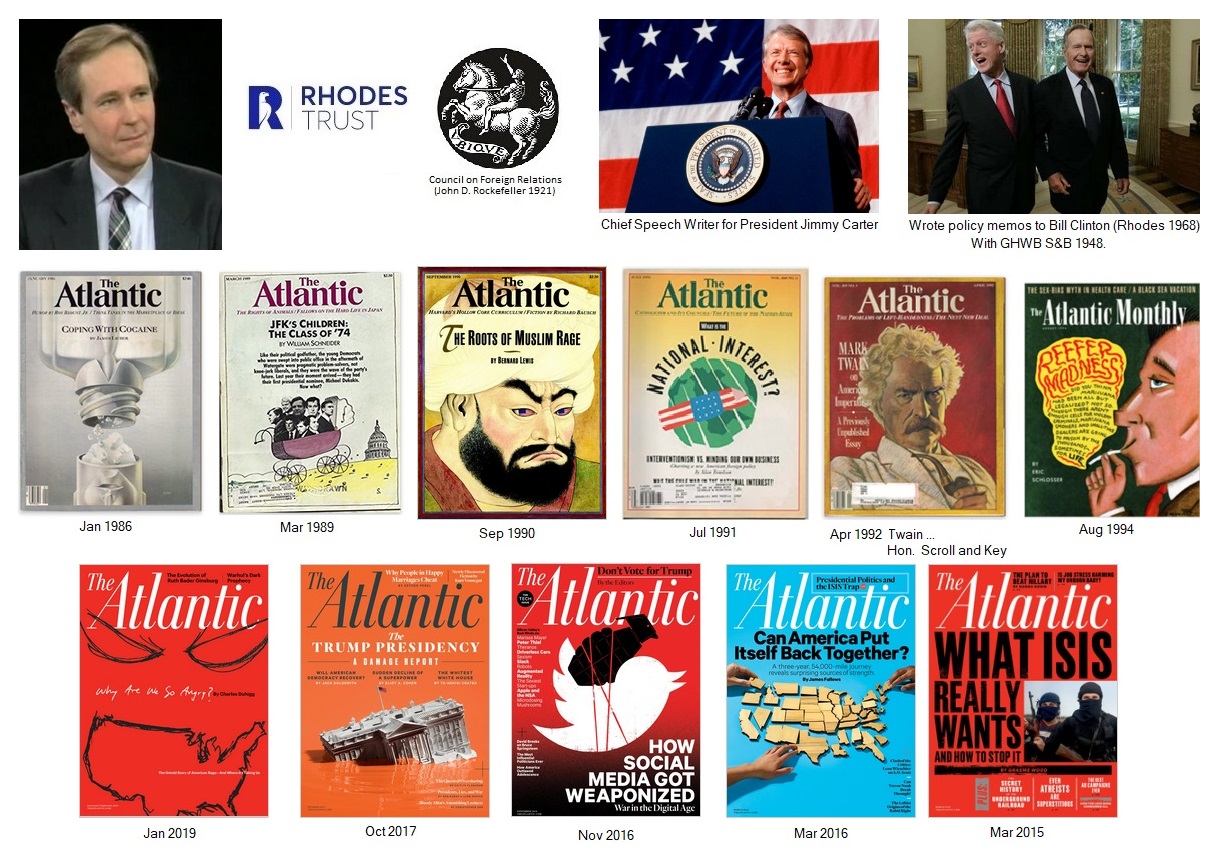
James Mackenzie Fallows (Rhodes 1970)
Writer and Journalist. Harvard University. Rhodes Scholar, University of Oxford. Council on Foreign Relations.
National Correspondent for The Atlantic Monthly
Fallows’s most influential articles have concerned military policy and military procurement, the college admissions process, technology, China and Japan, and the American war in Iraq. Fallows is an instrument-rated pilot.
Starting in the 2010 Academic Year, he is a visiting Professor in U.S. Media at the United States Studies Centre at the University of Sydney.
Since 2009 he has been the regular news analyst for NPR’s Weekend All Things Considered. From 1996 to 1998, he was the editor of US News & World Report. He was the founding chairman of the New America Foundation, a nonprofit group based in Washington D.C..
2003 - He has been a finalist for the National Magazine Award five times and won in 2003, for “The Fifty-First State?” (The Atlantic, November 2002), which was published six months before the invasion of Iraq and laid out the difficulties of occupying the country. He won the National Book Award for National Defense and won a NY Emmy in 2010 for his role as host of a documentary series, “Doing Business in China”.[3]
2001 - Published, Free Flight, which describes the new generation of “personal jets” and other advanced aircraft now coming onto the market from Eclipse Aviation and Cirrus Design, as well as the story of Cirrus founders brothers Alan and Dale Klapmeier and how they became involved in aviation. Fallows has received numerous honorary degrees, including from the University of Utah, the University of Maryland, the University of Redlands, Northwestern University, and in 2008 Ursinus College.[5]
2000 to 2001 Academic Year, Fallows taught at the graduate school of journalism at the University of California, Berkeley, and in 2010 he was the Vare Writer in Residence at the University of Chicago.
1999, he spent six months at Microsoft designing software for writers.[3] More recently, he has written about the design of the Open Source Applications Foundation’s information manager, code-named Chandler. He was the on-stage host for the IDG Corporation’s “Agenda” conference (no relation to Agenda software) in the early years of the 2000s (decade) and of Google’s “Zeitgeist” conference starting in 2005. He has written regular technology columns for The New York Times and The Atlantic.[3]
Fallows has had a long interest in technology, both writing about and helping to develop it. He’s taken a special interest in personal information management software, going back to Lotus Agenda which he glowingly reviewed for The Atlantic in 1992 (“Of all the computer programs I have tried, Agenda is far and away the most interesting, and is one of the two or three most valuable”). During the operating system wars of the early and mid-nineties, Fallows used and wrote about IBM’s Operating System/2 (OS/2) and its battles with MS Windows, often frequenting the Canopus forum and online community on CompuServe.[3]
Fallows also wrote policy memos to Democratic President Bill Clinton (Rhodes 1968).[3]
1980s and 1990s Fallows was a frequent contributor of commentaries to National Public Radio’s Morning Edition.[3]
From 1979 through 1996, he was the Washington Editor for The Atlantic. For two years of that time he was based in Texas, and for four years in Asia. He wrote for the magazine about immigration, defense policy, politics, economics, computer technology, and other subjects.[3]
1977 to 1979 - Chief Speechwriter for President Jimmy Carter (Gridiron. Trilateral Commission)
Vietnam War - Early in his career, he wrote an article called “What Did You Do in the Class War, Daddy?” (Washington Monthly, October 1975). It described the “draft physical” day at the Boston Navy Yard in 1970, in which Fallows and his Harvard and MIT classmates overwhelmingly produced reasons for medical exemptions, while the white working-class men of Chelsea, Massachusetts were approved for service. He argued that the class bias of the Vietnam draft, which made it easy for influential and affluent families to avoid service, prolonged the war and that this was a truth many opponents of the war found convenient to overlook.[3]
From 1970 to 1972 - Rhodes Scholar, Queen’s College, University of Oxford.[1][3]
Harvard University.
Born 2 Aug 1949. Age 70.
[2] - FYI - Wiki - James Mackenzie Fallows (Rhodes 1970)
[3] - Biography - James Mackenzie Fallows (Rhodes 1970)



Comments